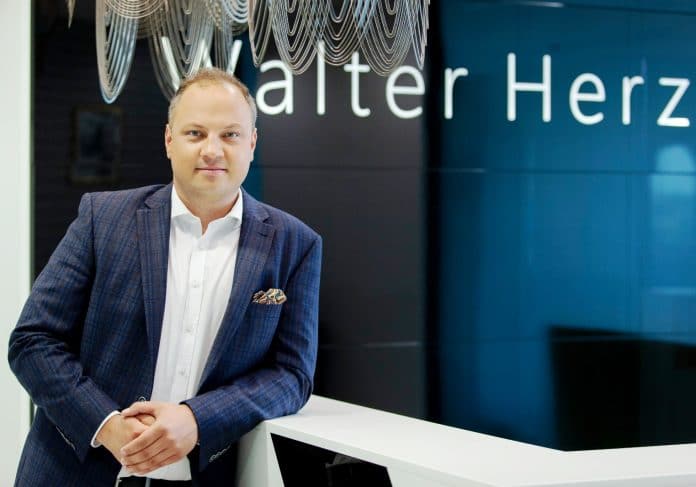Consistent implementation of planned investments now requires companies to search for alternative ways of raising capital.
In a situation when banks tightened their financing conditions, and for some industries completely stopped lending, the implementation of new projects became a challenge for many companies. For investors who have their own real estate, the way to raise capital may be sale and lease back. The transaction in the sale and leaseback formula allows to release the blocked funds, obtain funds cheaper than in the bank, and at the same time gives the opportunity of continuing to use the property on the basis of lease.
These types of transactions are, above all, an opportunity to take advantage of the excellent market conditions by the warehouse sector, which is currently developing at an unprecedented pace. The scale of interest in real estate in this segment has recently been shown by, for example, investment market statistics. In the first half of 2020, according to Walter Herz data, almost half of the acquisitions in Poland concerned office buildings. And already in the third quarter, the office was replaced by logistics, which in this period was responsible for 70 per cent of total transaction volume.
However, the development of new warehouse investments is significantly hindered in a situation where banks close the tap and selectively approach real estate financing. Investors must have their own down payment at the level of 35-40 per cent today, or show a pre-let or pre-sale exceeding even 50 per cent. Whereas previously, a down payment of 20-30 percent was sufficient.
Option for the real estate market
– For the warehouse and industrial sectors that are experiencing a period of expansion, it is also a good way to release funds for reinvestments. Sale and leaseback transactions are usually not widely communicated. Nevertheless, interest in such projects in various segments of the real estate market has recently grown significantly. They are chosen by companies that are looking for sources of financing other than banks. We are currently conducting two transactions of this type for clients from the automotive industry. The advantage of such transaction is time, because this type of process can be carried out relatively quickly – says Bartłomiej Zagrodnik, Managing Partner/ CEO at Walter Herz.
– Sale and leaseback is an option that so far has not been used often in Poland. Unlike, for example, in the United States, where it is the market standard. However, the amount of capital currently present on our market is significant. Such transactions spark interest of, among others, investment funds for which the purchase of real estate combined with its long-term rental is a very attractive choice. The gradually growing importance of our country as a market for investing capital attracts new investors. The volume of investment transactions has been increasing regularly in recent years, to reach a record value of over EUR 7 billion in 2019. And even the last year, which has not been easy, brought a good result – EUR 5.5 billion – adds Bartłomiej Zagrodnik.
Sale and leaseback transactions offer many benefits. By selling real estate, the company gets rid of the burden related to the management of the facility and can focus on its core business. The company’s cost base is also being optimized; in the case of real estate sales, the several dozen-year depreciation period is replaced by one rent invoice. Moreover, the company not only does not need to move the business to another location, but also maintains control over the rented property. As a result of the transaction, it improves the financial result and gains capital for investments.
Record transaction value in Europe and Asia
Walter Herz analysts point out that the number of sale and leaseback transactions increases in periods when the overall economic situation is deteriorating. During the crisis in 2008, their value in Europe reached EUR 13 billion. In recent years, the volume of such transactions has increased. In 2019, it achieved record sales in Europe and Asia. As many as 430 transactions carried out in Europe generated sales of EUR 23.1 billion in 2019. Thus, the record from 2018, amounting to EUR 17 billion, was beaten.
Last year, we could also observe further large sale and leaseback transactions. In May 2020, warehouses complex located in the UK was acquired by Aviva Investors for £ 107m from clothing manufacturer Next, which then leased the property. Investcorp, in turn, bought Coca-Cola’s headquarters in Belgium for USD 88 million.
Such transactions were also noted in Poland. Last year in June, DSV, a global provider of transport and logistics services, completed a sale & leaseback transaction with the French investment company Corum Asset Management, which concerned the new International Shared Services Center DSV in Warsaw with 20 thousand sq m.
Also, the purchase of the former Warsaw headquarters of the Telecommunications and Telegraphic Office with 49 sq m. of space by Zeitgeist Asset Management from Orange for EUR 81 million, was among the larger transactions recently carried out in our country. The investor also purchased the Main Post Office in Cracow from Orange.
Moreover, Towarzystwo Ubezpieczeń i Reasekuracji Warta has completed the sale and leaseback of a building at Aleje Jerozolimskie Street in Warsaw. As part of a portfolio transaction, an Austrian investment firm FLE, acquired five self-service Makro Cash & Carry wholesalers in Poland from a German company Metro, which still operates wholesalers.
Hope for REITs
The commercial real estate market in Poland may also be supported by REITs (real estate investment trusts), the topic of which has recently returned. They have been developed since 2016. The next version of the assumptions regarding the financing of real estate investments by individuals and institutions in exchange for dividends is to be completed this autumn. Companies established for this purpose have a chance to significantly contribute to the development of further commercial projects financed by dispersed capital.
The introduction of similar regulations in the Czech Republic increased the share of Czech investors from 1 per cent to 37 per cent, displacing foreign funds. In Poland, the commercial real estate investment market is still dominated by foreign investors, who are responsible for around 95 per cent of transaction value.
However, it is going to be a long time before the first transaction via REITs is carried out in our country. In addition to introducing appropriate legislation and creating the companies themselves and raising capital, it is necessary to prepare the transaction process itself, which also takes many months. Therefore, we are talking about a two-year perspective, when it will be possible to evaluate the effectiveness of this solution.


















